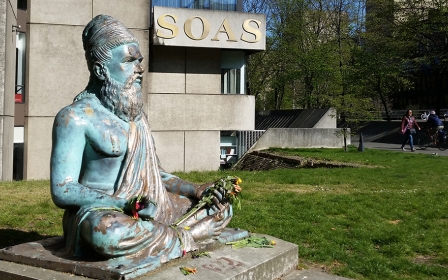Prevent police 'tried to recruit asylum seeker as mosque informant'

A Kurdish asylum seeker has told Middle East Eye that Prevent police officers in Wales asked him to work for them as an informant in local mosques in return for help with his immigration status.
Mahdi Rahimi, a 25-year-old who fled to the UK from Iran nine years ago, was arrested in Newport, south Wales, in the aftermath of last September’s Parsons Green bombing.
He was subsequently released without charge but told MEE his arrest, and media coverage of his case, had cost him his home and left him requiring prescribed medication for anxiety.
Rahimi also described how he had previously been approached by police officers through the Prevent programme, a strand of the British government’s counter-terrorism strategy which aims to identify people vulnerable to being drawn into terrorism.
He said he was originally referred to Prevent in 2011 after a member of staff for a company which arranged and managed accommodation for asylum seekers found a can of anti-freeze in the house where he was living and reported it to police because it was flammable.
Another staff member then started to ask him questions about “Muslim issues”, Rahimi said.
Later, Rahimi said, he was approached by Prevent officers working for Gwent Police who suggested they could help him with his immigration status if he was prepared to work as an informant in local mosques.
"We can help you with your status if you work with us,” they told him, according to Rahimi’s account. "It is your opportunity.”
Rahimi said he refused to cooperate but was visited by police two or three more times.
'Prevent can drive people mad'
“The Prevent strategy can drive people mad,” he said. “If you’re being put under surveillance and questioned for no reason - it can make people crazy. For someone who doesn’t have knowledge of Islam, they can get mad.”
Frances Webber, a former barrister with a specialism in immigration, asylum and human rights, told MEE that police efforts to turn Rahimi into an informant were “quite a common thing that happens to asylum seekers, particularly who are Muslims”.
But she said there would unlikely be any grounds for a complaint of police misconduct, unless the offer to help with an individual’s immigration case was also accompanied by some sort of threat.
“If so there might be grounds for misconduct in public office. It wouldn't be misconduct to ask someone, it would only be misconduct if it came with a threat: if you don’t cooperate we’ll get you out the country. Then you’ve got the problem of proving it, which is almost impossible. It’s his word against theirs," said Webber.
Peter Fahy, a former head of Greater Manchester Police and national police lead for Prevent, told MEE that seeking to recruit informants through Prevent would be “against the rules” and said that police would have no influence over Home Office asylum case decisions.
A spokesperson for Gwent Police told MEE that it was unable to comment on individual cases, but said the force “invests considerable time and resources in promoting community cohesion”.
“We work closely with partner agencies and with faith leaders from all religious communities to promote tolerance and respect among all the communities we serve.”
Prevent has been widely condemned by human rights campaigners over complaints that it is discriminatory against Muslims and amounts to a form of surveillance.
No evidence that Prevent 'empirically sound'
Earlier this month, the United Nations’ special rapporteur on racism, xenophobia and intolerance said there was “no evidence that Prevent actually prevents extremism, or that link between extremism and terrorism is empirically sound”.
E. Tendayi Achiume said Prevent had given public sector workers a mandate to “make life-altering judgments on the basis of vague criteria in a climate of national anxieties that scapegoat entire religious, racial and ethnic groups as the presumptive enemy”.
Further questions were raised about the effectiveness of the Prevent programme after it emerged that Ahmed Hassan, the 18-year-old Iraqi asylum seeker who was convicted of the Parsons Green bombing, was also referred into the Prevent programme and had been placed in a "deradicalisation" programme for a year, prompting a review by Surrey County Council into its handling of Hassan's case.
Rahimi told MEE he had met Hassan through a mutual friend and the pair had been on a camping holiday with others and spoken on the phone. He said he believed this had been what had drawn him into the police investigation.
Rahimi said he had been "disgusted" when he read that Hassan had carried out the bombing.
New MEE newsletter: Jerusalem Dispatch
Sign up to get the latest insights and analysis on Israel-Palestine, alongside Turkey Unpacked and other MEE newsletters
Middle East Eye delivers independent and unrivalled coverage and analysis of the Middle East, North Africa and beyond. To learn more about republishing this content and the associated fees, please fill out this form. More about MEE can be found here.




